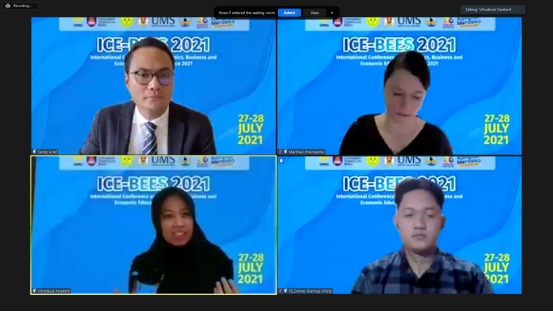Economic Faculty, Universitas Negeri Semarang (Unnes), successfully held the International Conference on Economics, Business and Economic Education (ICE-BEES) 2021. ICE-BEES 2021 will be held for two days on 27-28 July 2021 with the theme “Innovation in economics, business, and education for a sustainable environment during the COVID-19 Pandemic.
Dean of the Faculty of Economics, Professor Heri Yanto, M.B.A, Ph.D, in his welcoming speech said that ICE-BEES 2021 aims to develop insight and improve the competence of academics, researchers, practitioners, and educators in the fields of economics, accounting, management, and economic education on an international scale. Furthermore, the ICE-BEES 2021 conference is also expected to be able to increase the dissemination of the latest research in the fields of economics, accounting, management, and economic education. Afterward, Rector of Unnes, Professor Dr. Fatkhur Rokhman, M.Hum, officially opened the ICE-BEES 2021.
In organizing ICE-BEES 2021, Economic Faculty Unnes is partnering with the Faculty of Business Management, Universiti Teknologi MARA Melaka, Malaysia, Institute Of Business Excellence, Universiti Teknologi MARA Melaka, Malaysia, Faculty of Economics, State University of Jakarta, and Faculty of Economics, Tidar University.
ICE-BEES 2021 was attended by 283 participants from well-known universities in Indonesia, such as the University of Indonesia, Telkom University, Bandung Institute of Technology, Bandung State Polytechnic, Diponegoro University, Sebelas Maret University, Agung Podomoro University, Malang State University, Tidar University, Jakarta State University, and others. In addition, world-renowned universities such as Birmingham University, Tashkent University of Information Technology, Uzbekistan, Universiti Kebangsaan Malaysia, Universiti Teknologi Malaysia, Universiti Teknologi Mara, Malaysia, Kasetsart University, Thailand, Universiti Sabah Malaysia, and Macquarie University, Australia. While the articles presented were 215 articles.
The plenary speaker of ICE-BEES 2021 are James P Walsh, Ph.D. (IMF Senior Resident Representative for Indonesia), Prof. Martina Linnenluecke (Director of Centre for Corporate Sustainability and Environmental Finance, Macquarie Business School (MQBS), Macquarie University), Prof. Datuk Dr Kasim Hj Md Mansur (Dean Faculty of Business, Economics and Accountancy Universiti Sabah Malaysia), and Dr. Vitradesie Noekent, S.E., M.M (Economic Faculty, Unnes).
James P Walsh, Ph.D., conveyed that the COVID-19 pandemic had an effect on world economic growth, both in developed countries such as the European Union, America, China, Japan, India, ASEAN countries, and Indonesia itself. The impact of COVID-19 is more visible in some areas, especially in developing countries. Credit growth, which had been on a steady decline before the Pandemic, is expected to recover as retail sales pick up. The Monetary Policy Response in Indonesia is to set lower interest rates. by using a “triple intervention strategy” to stabilize domestic market conditions. Central banks buy government bonds in the primary market. Capital flows are slowly recovering. However, domestic credit growth remains weak. Credit growth was restrained despite strong deposit growth. Meanwhile, the financial policy response is lower profitability, debt restructuring, and more companies taking risks. Regulatory flexibility such as crisis management and resolution frameworks need to be updated to prepare for financial sector pressures while maintaining credit flows.
Professor Datuk Dr Kasim Hj Md Mansur said that the COVID-19 pandemic disrupted the global labour market. The COVID-19 pandemic has significantly impacted socio-economic aspects such as disruption to tourism, trade and production, worsening vulnerability, social protection, job losses, economic downturn, and monetary and fiscal policy responses. Therefore, a large-scale comprehensive response is needed with a focus on developing countries so that they can improve economic, social, and community welfare conditions.
Professor Martina Linnenluecke discussed the need to address global challenges alongside COVID-19 recovery, with a particular focus on tackling climate change and biodiversity loss. Professor Martina outlined the urgency of her research on integrating science-based targets into accounting and finance frameworks. Significant economic rescue measures are needed and a focus on environmental recovery and substantial improvements in carbon handling are required.
Dr. Vitradesie Noekent, MM, explained that the COVID-19 pandemic fosters entrepreneurial activities in the university environment. In particular, it is the result of research and community service activities produced by lecturers. The discovery of new products, resources, knowledge, and opportunities is the result of experiments that can solve problems that exist in society. She gives examples of collaboration which is contribute during the pandemic such as GeNose C-19 device and the red and white vaccine. The GeNose C-19 uses artificial intelligence — in the form of an electronic nose — to analyze breath samples and identify elements unique to COVID-19. The main challenges of entrepreneurial activities in universities are culture, ineffective management, rigid bureaucracy, and reward systems.

